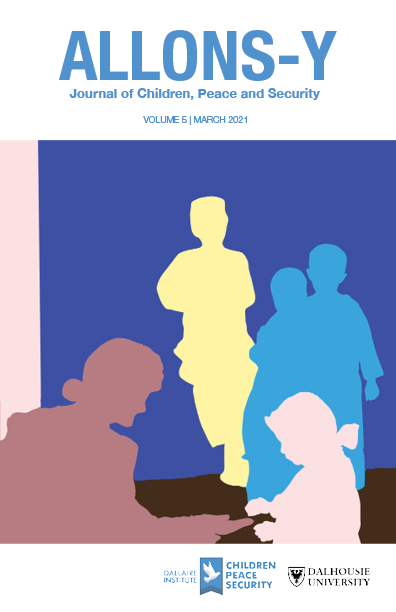Au-delà de la binarité : L‘importance de la dimension sexospécifique dans le recrutement et l‘utilisation des enfants
DOI :
https://doi.org/10.15273/allons-y.v5i0.10214Mots-clés :
enfants soldats, enfants face aux conflits armés (CAAC), sexospécificité, non binaire, orientation sexuelle, identité et expression de genre, et caractéristiques sexuelles (SOGIESC), Principes de VancouverRésumé
La dimension sexospécifique est importante dans les conflits. Les normes socioculturelles, les attitudes et les attentes liées au sexe dictent les causes, le déroulement et les conséquences de l‘enrôlement d‘enfants comme soldats. Malgré les engagements internationaux, le recrutement et l‘utilisation d‘enfants dans les forces et groupes armés persistent. Le présent document résume les données quantitatives existantes du mécanisme de surveillance et de communication de l‘information des Nations Unies, à la lumière d‘une analyse qualitative complémentaire provenant d‘autres sources, afin de mettre en évidence les façons dont les normes sexospécifiques peuvent (a) conduire au recrutement, (b) déterminer les rôles et les responsabilités, et (c) influer sur les résultats pour les enfants associés aux forces ou groupes armés. L‘article étudie les besoins et les expériences des filles et des garçons et, lorsque les données le permettent, ceux des enfants ayant une orientation sexuelle, une identité et une expression de genre et des caractéristiques sexuelles (désignées en anglais par l‘acronyme SOGIESC) différentes. Il formule des recommandations sur les mesures éventuelles qui peuvent nuancer davantage la perspective sexospécifique proposée dans les Principes de Vancouver. Il présente des suggestions sur la manière de garantir que les interventions de prévention et de réponse sont (1) soutenues par des données ventilées de manière cohérente, (2) conscientes des facteurs sexospécifiques à l‘origine du recrutement, et (3) adaptées aux besoins distincts des enfants aux SOGIESC diverses.Téléchargements
Publié-e
2021-03-31
Numéro
Rubrique
Commentaries





